Table of Contents
What is Battery Swapping!

Suppose Your EV runs out of charge in the middle of the journey or the battery is showing it’s last line. Would You become anxious of getting a charging point or killing hours to get it recharged? No You wouldn’t, as You have already noticed the sign of a battery swapping station at 200 metres away.You simply go there, submit Your battery and take a new one to fit into Your vehicle and start again whistling away worries and tensions or Range Anxiety.
Yes, the battery swapping service is as easy as it is. And all the future EVs will not be without it.
How does Battery Swapping Work!
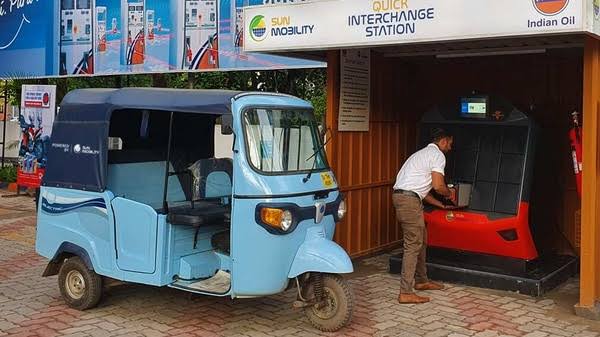
Battery swapping service is a paid service. A customer here, while buying an EV never has to pay money for the EV battery, so it’s a lot less money that she has to pay just only for the vehicle and not the battery. Instead she takes a yearly subscription of the battery for his vehicle. Wherever she needs a recharge of the battery, a new fully charged battery is fitted into her vehicle and the chargeless battery is taken by the service provider. The battery can be replaced in a charging station or there will be a battery mobile van just a phone call away from anywhere on the road.
An automatic and smart battery swapping station in China can show how easy the process of swapping a battery of an Electric Car is! It only takes about 3 minutes to charge fully with battery swapping instead of hours to recharge.
Why Battery Swapping?

Battery Swapping is a more convenient practice than Charging a battery on Your own as it addresses the three major challenges that faces the adoption of EVs among the masses – they are firstly, Slow Charging Time of EV Batteries , secondly, the issue of Vehicle Range and thirdly, the High Upfront costs of buying batteries and setting up battery charging stations. But ,removing a charged out battery and replacing it with a full-charged one, which is opposed to recharging the existing battery unit, is not a widely accepted concept outside China still now.
According to Chetan Maini, the CEO of Sun Mobility Solutions and the man behind India’s first electric car Reva, battery swapping practice will not only help accelerating electric mobility by 30% but it will also help 6 times in less lithium import for the country and help 3 times in increasing an overall battery life.
The establishment of “Gachaco”, a joint venture by Enos Holdings Inc, Honda Motor Co Ltd, Kawasaki Motors, Suzuki Motor corporation and Yahama Motor Co Ltd , to build Baas ( Battery as a Service) platform is itself a strong message to the future that battery swapping is going to be a very important service indeed.
Electric Mobility in India:
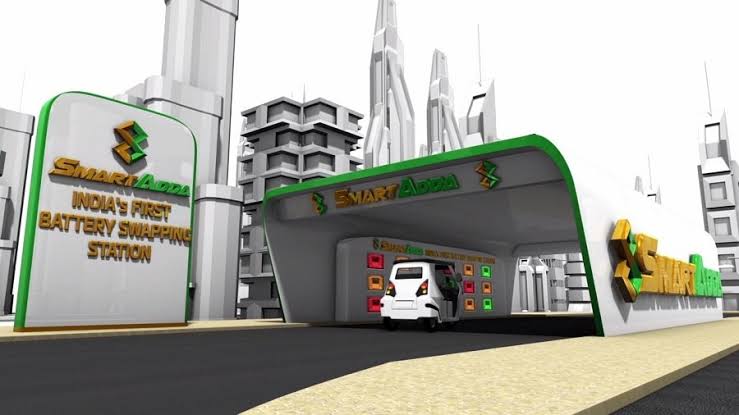
According to the Central government’s e-vahan portal, the number of Electric Vehicles in India is close to Ten lakh. The commitment made by the country during the COP21 summit held in Paris to reduce carbon emission intensity by more or less 35% by 2030 from 2005 is the target now.
but the Electric Vehicle sales is still less than one percent in the country in comparison to the ICE (Internal Combustion Engine) powered vehicles. The central Government as well as the state governments have taken various initiatives to popularise the adoption of Electric Vehicles among the masses. Govt. has reduced the GST of Electric Vehicles from 12% to 5% and Charging stations also to 5%. The FAME II scheme ( For knowing details of FAME II, Click HERE> https://pmmodiyojana.in/fame-india-scheme/ ) has been initiated to subsidize the price of the EVs. An amount of Ten thousand Crore will be invested under the FAME II scheme for the transition and infrastructural support for the adoption and easy mobility of the EVs. Still there is a long way to go. Without proper infrastructural development and growing of general consciousness the adoption of Electric Vehicles rapidly will not be possible. The rising price of the fossil fuels will also not encourage the adoption if there is fear and doubt regarding the EVs.

Battery Swapping Services in India:
Though the concept of battery swapping services is very new in India though some visionaries have already started working on building the network of battery swapping infrastructure in the country to make possible the easier adoption of EVs in India in distant future.
Sun Mobility Solutions:

Founded in 2017 and based in Bengaluru , Sun mobility solution which is a joint venture between SUN group and Chetan Maini’s Maini group is regarded as the one of the most prominent player to provide battery swapping service in India. German company Boss has also own 26% stake in the company making it one of the most interesting future oriented startup. Sun mobility aims to provide energy service to around 10 lakh EVs( 1 million) by the year 2025.
Sun has partnerships with Microsoft, Uber, Indian oil Corporation, Ashok Leyland, Piaggio and will be operational in the major Indian cities soon. Indian Oil Corporation has also gone into partnership with Sun Mobility in order to set up the battery swapping facility, called Quick Interchange Station (QIS).
Amara Raja Power Systems:

founded in 1985 and based in Tirupati, this well known battery maker company has also started it’s projects regarding battery swapping station in cities like Kochi Tirupati and Lucknow with partnership with BPCL.
Lithion Power:

Founded in 2016 and based in New Delhi Lithion power is setting up its network in the heart of India, the capital and adjacent Haryana and is investing more than a billion dollar amount to create an ecosystem for electric vehicles to swap batteries. Lithion power has partnership with multiple companies of battery manufacturers fleet operators and other sectors of automobile solution providers.
Esmito:

Founded in 2018, this Chennai based company is providing a platform for EV infrastructure management and battery swapping system. Esmito is collaborating with different operators and showing its presence in more than 6 States across India to provide the future energy solutions of EV network.
Voltup:

Voltup is founded in 2019 and is providing a smart charging Technology platform and battery swapping systems for EV owners. The company has designed and manufactured batteries for EVs , set up battery charging stations and battery management system with battery swapping stations. It is also planning to extend it’s infrastructure of battery charging solution with solar energy. Voltup has partnerships with HPCL and has deployed some stations in Jaipur and Kolkata.
Chargeup:
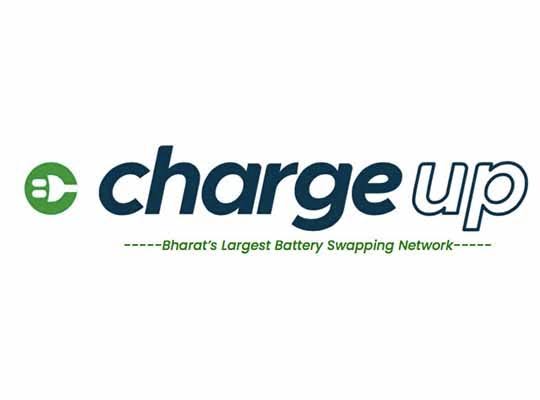
Based in New Delhi and set up in 2019, Chargeup solutions is providing their services to thousands of customers in Delhi NCR region by swapping their vehicle battery by procuring battery from third parties. It has been already offering ‘battery as a service’ to electric three wheeler drivers and is planning to extend it’s reach more to production and providing of battery swapping service.
Okaya Power Group:

founded in 2002, okaya power solution is serving the e-rickshaws by providing battery sweeping service in their swapping stations. Okaya has its own branded automobiles as well as it is also collaborating with companies like prakriti immobility to provide charging solutions and battery swapping services with its network.
RACE Energy:
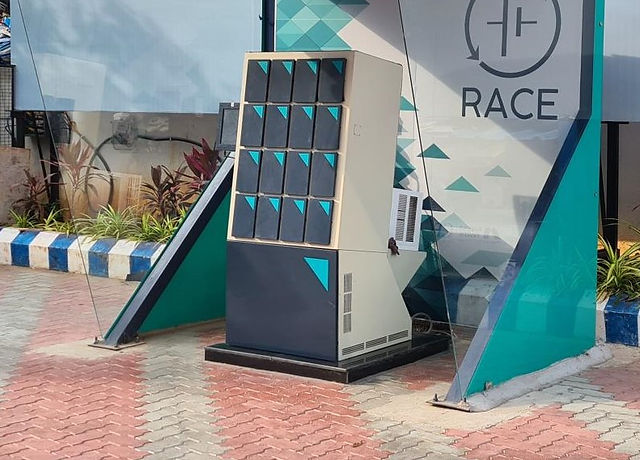
Founded in 2018 with his headquarters in Hyderabad RACE energy is building a battery swapping network for electric wheelers. The company is providing fully swappable battery pack build for most of the electric vehicles and a fast smart and connected battery sweeping network. Which is also providing a unique system of paying as much as you use of the battery capacity with fully integrated digital payment capabilities in the battery swap stations.
Battery Pool:

With its headquarter in Pune and founded in 2018, BatteryPool has setup smart battery swapping stations in Pune and Delhi. It’s started with providing flit service to small business and delivery boys and is planning to extend its business to more customers in future. The company is also planning to build partnership with battery manufacturers and give a comprehensive solution in batteries swapping service and automotive solutions.
CHARGE+ Zone:

Founded in 2018 with it’s headquarter in Vadodara and part of TecSo Global group,the company is operating over 100 charging stations in India and this creating a new business swapping model termed ‘battery as a fuel’. Charge zone has electrified NH8 Highway connecting Mumbai to Ahmedabad and open unmend charging networks. The the company is planning to provide battery sweeping service and has become the charging partner of Ashok Leyland and Ahmedabad janmarg limited.
Numocity:

Numocity is founded in 2018 which has headquarter in Bengaluru. This company is providing comprehensive software Solutions for recharging and swapping space. Numocity has responsibilities regarding IoT ( Internet of Things) enabled bulk charger management as it monitoring and new business models to provide battery swapping service and emobility solutions for the emerging EV market in India. It offers at present a middleware platform for providing energy as a service and battery swappable solutions.
Battery Smart:
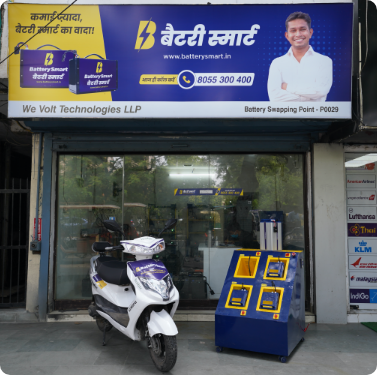
Based in New Delhi, this company provides battery swapping service to mostly e-rickshaws and two wheelers through third party station owners.
Hero Moto Corp and Gogoro:

Taiwan based, Gogoro, the global leader in urban battery-swapping and smart mobility innovation has joined hands with Hero Moto Corp Pvt. Ltd. to set up battery swapping services in India. According to Gogoro ” The companies will establish a battery swapping joint venture to bring Gogoro’s industry-leading battery swapping platform to India and will collaborate on electric vehicle development to bring Hero-branded, powered by Gogoro Network vehicles to market. “

Mr. Pawan Munjal, the Chairman and CEO of Hero MotoCorp. said “This partnership will further enhance the work and partnerships that we already have in our EV portfolio. This will further extend the work which we are doing at our R & D hubs at the Centre of Innovation and Technology (CIT) in Jaipur & our Tech Centre in Germany. Hero and Gogoro’s vision and commitment are perfectly aligned towards the common goal of accelerating the shift to smart, sustainable electric mobility in India, and around the world. With this new partnership, we commit to introducing a sustainable mobility paradigm, first in India and then in other markets around the world. This partnership will strengthen and expedite the Indian government’s electrification drive and will have a significant impact on India’s energy and mobility future.”
Indian Govt. policy on Battery Swapping:

The Govt. of India is playing positive on the battery swapping policy. Neeti Aayog, the public policy think tank of the government plans to roll out a clear battery swapping policy for the convenience of the EV owners that will boost the e mobility in the country.
The Chief Finance Minister of the Union Government of India Sushri Nirmala Sitaraman said ” For setting up battery stations at scale a battery swapping policy will be brought out and interoperability of standards will be formulated.” She also said that ” the private sector will be encouraged to develop sustainable and innovative models for battery and energy as a service which will increase efficiency in EV ecosystem”
The proposed policy will introduce as well as boost business models like Battery Leasing, Battery as a Service (BaaS), setting up swapping stations, Third party swapping providers and many more business models in future.
The Problems of Setting Up Battery Swapping Stations:

There are though certain problems for setting up battery swapping stations and practically implementing battery swapping in a vast area network for four wheelers and heavy vehicles. Firstly, the primary cost for setting up the battery swapping system is really very very high. It involves costly robotic machinery to swap the battery automaticallyto reduce the time needed for swapping the batteries. Secondly, a large number of expensive batteries are needed ready to hand for swapping. Thirdly, a large physical space is needed for automatically swapping the batteries for multiple EVs. Fourthly, the EV batteries that are sensitive need to be standardized in both physical dimensions and different electrical parameters before the possible implementation of automatic battery swapping.
For the Electric two wheelers and light weighted three wheelers however automated battery swapping infrastructure may not be needed. Still the storage of large number of ready to fit batteries are a definite problem.
Battery Swapping: Indian Future:

The Indian Govt. think tank Niti Aayog has come with a Draft Policy on battery swapping on the 21st April, 2022 Thursday. As already stated, the number of Electric powered vehicles in India is still marginal as compared to fossil fuel powered vehicles, hence it is difficult to set up a high network of battery swapping without government encouragement. Fortunately, the government ia also curious to set up a positive environment for wide adoption of Electric Vehicles and the Private players are also assuming the forthcoming possibilities of the Electric Vehicle adaptability scenario in the country of billions.
India is a land of opportunities, possibilities, new research and wonders. The Future of Battery Swapping Technology may take a few years more but it will surely be a boon to the millions of riders and drivers to find a cost effective way to own their own Electric Vehicles.
( Disclaimer: No copyright violation is intended while using the images in the article.We acknowledge gratitude to all the respective owners of the images.)
